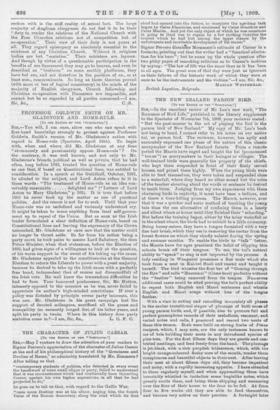PROFESSOR GCLDWIN SMITH ON MR. ' GLADSTONE AND HOME-RULE.
[To THE EDITOR ON VIII "SPECTATOR."]
Sin,—You will, I am sure, allow one who can speak with first-band knowledge strongly to protest against Professor Goldwin Smith's version of Mr. Gladstone's action with regard to Home-rule (Spectator, April 24th). To begin with, when and where did Mr. Gladstone at any time "strenuously and passionately oppose Home-rule " ? On the contrary, it was well known, and not only to Mr. Gladstone's friends, political as well as private, that he had often, long before 1885, treated the question of Home-rule as one that, if based on constitutional lines, was entitled to 'consideration. In a speech at the Guildhall, October, 1881, he alluded to the subject, and Lord Acton refers to it in these words : "The treatment of Home-rule as an idea con- ceivably reasonable delighted me" (" Letters of Lord Acton to Mary Gladstone," p. 105). It is true that before 1885 he never took up the matter as one of practical politics. And the reason is not far to seek. Until that year Home-rule was an undefined and variously understood cry. It might be taken to mean anything from local self-govern- ment up to repeal of the Union. But as soon as the Irish • leader formulated a clear definition of Home-rule, based on Constitutional lines and leaving the supremacy Of the Crown untouched, Mr. Gladstone at once saw that the matter could no longer be thrust aside. So far from his action being a • party move, he took pains to assure Lord Salisbury, the then Prime Miniater, when that statesman, before the Election of 1885, had given signs of a willingness to look at the question, of his warm support in the event of his taking up the cause. Mr. Gladstone appealed to the constituencies at the General Election to return the Liberals to power with a great majority, because he desired to take up the Irish cause with a perfectly free hand, independent (but of course not disregardful) of the Irish vote. He well knew the tremendous difficulties he bad to fade. Your honoured predecessor, Sir, Mr. Hutton, intensely opposed to the measure as be was, never failed to appreciate its author's high-minded convictions. If over a policy was dictated by principle Tereus party interests, this was one. Mr. Gladstone in his great campaign lost the support of devoted colleagues, sacrificed all the peace and tranquillity (so earnestly longed for) of his latter years, and split his party in twain. Where in this history does party
ambition come in am, Sir, Eto., L. a F. C.










































 Previous page
Previous page